The 1800s were a time of great change and progress for the American people.
Pioneers braved harsh conditions, long journeys, and uncertainty to build new lives in uncharted territories.
We can learn a lot from the way they lived their lives – even if that means incorporating some of their items into our modern homes.
Here’s a look at some of the essential pioneer items you should still have around your home today.
Axe
The axe is one of the most important tools of any prospective pioneer. This was used by pioneers in many ways, from chopping wood to building furniture and shelters.
If you’re in the market for an axe for your homestead, make sure you get an axe made with quality materials that won’t let you down when it counts.
Sickles
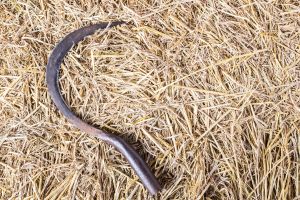 Sickles are not just a tool used by farmers; they can be a great way to cut through thick brush or even chop down trees.
Sickles are not just a tool used by farmers; they can be a great way to cut through thick brush or even chop down trees.
If you plan on clearing any land or want to do any gardening, consider investing in a good sickle for those times when an ax isn’t enough.
Maps And Guidebooks
Every good pioneer needs to make sure they know where they are going before they set out on their journey.
That’s why having some maps and guidebooks handy can be really helpful when it comes to exploring new territories and finding your way around unfamiliar areas.
Washboards
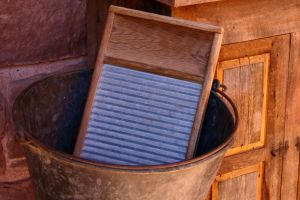 You may not have heard much about washboards lately, but these handy devices were once an essential part of life for many pioneers.
You may not have heard much about washboards lately, but these handy devices were once an essential part of life for many pioneers.
Washboards made it possible to do laundry without access to a washing machine or running water – something that’s still true today.
To make your job even easier if you’re ever stuck without electric power, you can learn here how to build your own off-grid washing machine.
Traps
Traps were essential tools for pioneers in the 1800s and they can still come in handy today.
There are many different types of traps available, from simple snares to more complex trigger mechanisms—all designed to capture an animal without harming it.
You never know when you may find yourself needing one, so it’s always good to have a few on hand
Spades And Hoes
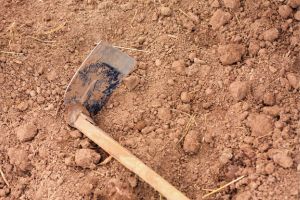 Spades and hoes are essential equipment for any budding pioneer who wants to start their own farm or garden. These tools will help you dig holes, till soil, move dirt, and weed out unwanted plants from your garden.
Spades and hoes are essential equipment for any budding pioneer who wants to start their own farm or garden. These tools will help you dig holes, till soil, move dirt, and weed out unwanted plants from your garden.
You can find these tools at any hardware store or online retailer.
Make sure you invest in high-quality spades and hoes so that they stand up against wear and tear over time.
Camping Supplies
Back in the day, pioneers had no choice but to travel with all their belongings on their backs—which meant they had to be prepared for any situation while out in the wilderness.
Related: 7 Deadly Canning Mistakes Even Smart People Make
Today’s modern camping supplies are much lighter than those used by our ancestors but still provide us with all we need while out exploring nature.
A few items to keep in your stockpile include reliable hiking boots, plenty of water bottles (or water purification tablets), lightweight sleeping bags/tents/tarps (for shelter), flashlights/headlamps (for visibility), first aid kits (for emergencies), and bug spray (for pesky bugs).
Cast Iron Cookware
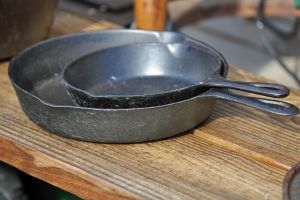 Cast iron cookware was popular during the 1800s and it is still popular today.
Cast iron cookware was popular during the 1800s and it is still popular today.
Cast iron cookware is incredibly versatile and durable, making it perfect for stovetop cooking and baking.
It can also be used over an open fire or campfire if needed.
The cast iron skillet was one of the most versatile tools in any pioneer kitchen. It could be used over an open fire or on top of a wood-burning stove, and was perfect for cooking everything from cornbread to fried chicken.
Plus, its sturdy construction meant it would last for years with proper care. Of course, cast iron skillets are just as useful today. Making anything from breakfast sandwiches to seared steaks is easy with this timeless tool.
Gimlets
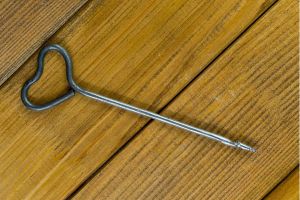 A gimlet is a hand tool that was used by early pioneers to bore holes into wood.
A gimlet is a hand tool that was used by early pioneers to bore holes into wood.
Though their primary purpose was utilitarian (to allow peg legs and bed posts to attach securely), many modern day artisans find creative ways to repurpose gimlets as decorative wall hangings or door handles.
Of course, having a gimlet or two on hand around your homestead is a good idea from a practical standpoint, since it will help you with a variety of construction projects.
Seeds
Pioneers relied on seeds as their main source of nutrition during their travels, and they can also be extremely useful today.
Seeds are lightweight and easy to store, which makes them perfect for camping trips or long journeys through the wilderness.
Canning Jars
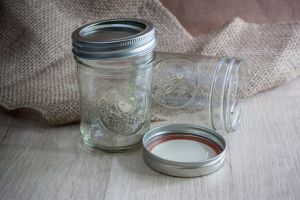 Canning jars were indispensable items during the pioneer days, providing both storage and preservation solutions for many families.
Canning jars were indispensable items during the pioneer days, providing both storage and preservation solutions for many families.
From pickles to jams and jellies, food was kept safe and portable inside these hardy glass vessels. Even hamburger meat can be canned using this guide.
Canning jars are still incredibly useful today – they make excellent containers for storing things like grains and spices as well as allowing you to preserve your own fruits, vegetables, and even meats at home.
Wooden Cooking Utensils
Wooden cooking utensils have been around since the early days of cooking. Wooden spoons, spatulas, ladles, and whisks were all essential kitchen tools during this time period and they are still widely used today as well.
The natural grain of wooden utensils makes them aesthetically pleasing while their durability ensures they will last a lifetime if taken care of properly. Plus, wooden utensils do not conduct heat like metal utensils do, meaning they won’t burn your hands when you’re stirring hot food on the stovetop.
A Good Broom
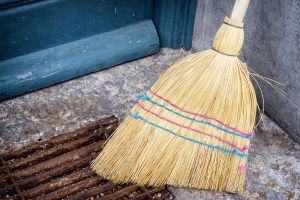 In the 1800s, brooms were essential tools for keeping homes clean and tidy—and they still are.
In the 1800s, brooms were essential tools for keeping homes clean and tidy—and they still are.
A good broom is not only great for sweeping up dirt and dust but also for removing cobwebs from hard-to-reach places like high ceilings or corners of rooms.
Firearms
This one may seem obvious, but having a firearm with you was absolutely essential during a long journey such as this. Not only did it help protect against wild animals, but it also protected travelers from bandits who were known to try and rob unsuspecting pioneers.
Related: Firearms for Emergency and SHTF Situations
Having a firearm such as a musket or shotgun was not only important for safety, but could also provide food.
A Good Knife
A knife was an absolute must-have item for any pioneer. A good knife could be used for many different things like cutting rope, harvesting crops, cooking meals and even defending yourself if needed.
Don’t Forget About the Pioneer Pantry!
It’s no surprise that packing light was incredibly important when traveling on the Oregon Trail, so it was essential to bring non-perishable items such as flour, dried corn, coffee, pine nuts and cured meat that could last several weeks without spoiling.
Of course don’t forget about hardtack–a type of biscuit made with flour and water that provided much needed sustenance during long days of travel.
Pioneers had so many amazing tools at their disposal that are just as useful today as they were back then.
From cast iron skillets and washboards to canning jars, having these items around your home can help you stay prepared for whatever life throws your way – whether it’s cooking up a storm or doing laundry without access to modern amenities!
Whether you’re looking for functionality or style, these 1800s pioneer items have stood the test of time – so why not give them another chance?
You may also like:
 Best States to Buy Your Prepping Property
Best States to Buy Your Prepping Property
How To Outlive An EMP The Early Pioneer Way (Video)
Things You Throw Away That You Should Add To Your Stockpile Instead

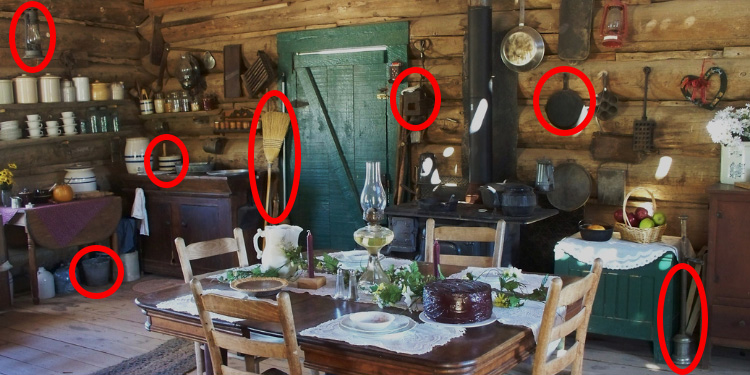




















A good article makes you think, as well as educates. What you need, what you don’t have, how, why, etc…. The few items mentioned here, makes you think of many others.
Hit the garage/estate sales, farm sales are good too.
Hit the Amish stores! They will have for sale NEARLY EVERYTHING you will need!
@Jess: no Amish, Mennonite or similar around here…
sadly.
As the youngest, I use to help my father out with his home projects. I was the little apprentice that would spring into action if he needed something that was back in the workshop because I learned the names of all of his tools. My father use to say “if you have the right tool the job is easy, if you don’t the job is a hard one.” This article help you think about what you might need and that’s a good list of tools.
Great article, thank you!
The list could go on forever, but I’d definitely add a method to start a fire…could you add those methods as a reply?
Maybe this helps: Steel + Flint
Who doesn’t like a good hoe
I like good cast iron
I have this list and much more. Tools for hand working the necessities of life. From these to bow saws, a refurbished treadle sewing machine, grain mill and meat grinders and more. some go back to the days of 2 or 3 times great grandparents. I even save my grandfather and Dad’s wood planes. Many heirloom kitchen tools too. Sives to all the sewing machine accessories to match my antique sewing machines. From grandma’s water bath canners to modern nonelectric pressure canners.
A late 1700s book with information on farming, husbantry, cooking recipies and how to store food or make a barrel of vinegar. A family treasure passed down for about 250 years. Had to ask grandma what some measures were such as a gill. Gill is a 6 oz teacup or 3/4 of a cup. Now the old recepies make sense. Great great grandfathers notes in the margins are interesting. Worm oil (with instructions for how to make it) as a linement for the horses or old folks who are stiff and achy, using Pennsylvania crude oil on hand tools to keep them from rusting….. oil in sand in a bucket, wash mud off of shovels and hoes then a dip through the oily sand. A light rub down on the handsaws or sythe after use. So simple, yet great advice to hand down to a son who then passed it on ’till it landed with me, a great great great granddaughter. One day I’ll pass it all on again.
I still watch for interesting or new to me tools at estate sales. I’ve added to my oil lamps and camping gear from yard sales. I’ve passed used things on to a son and grandson who love camping and fishing. I hope one of them will be interested in the old collectable poles I have. Two of my 4 kids have learned to sew, tat, knit, and crochet. The 2 treadle machines will pass on to them. The commercial leather sewing machine will go to my youngest son who is by far the best sewer. The hand tools they can decide. There are many duplicates.
Prepping isn’t just for me. It’s for the family and a few close friends I’m also helping out. This year I’m wintering with a friend and helping reclaim a long unused garden space and planting perennial food sources. I’m sharing wild cherries, native plums, wild gooseberries, ect. from my property and planting peaches, apples, pears, bush cherries, asperagus, strawberries, rhubarb, artichokes, grapes, elderberries, blackberries, and raspberries. Some will produce this year while others may take another 4 to 5 years. But it’s all food for the future.
I have tomatoes, stevia, celery and more just breaking ground under grow lights. I’m sharing seed starting supplies and saved heirloom seeds. It’s still about 2 months till planting times for most of the garden. I can plant corn in around 3 weeks. It will usually come up about the safe sprouting time or I can start it in a glassed in porch then transplant it into the chosen gardening areas, I have 2 kinds of sweet corn, a pop corn, broom corn and a dent corn for grinding into meal. None can be close to the other kinds of corn. That’s so I can save seed.
My food forest is pretty much in place and gardening specifically or just foraging my property I’ll have plenty for me. Wild or naturalized areas are the key. Native fruits or vegetables take very little care after the initial time to get established. over the years I added many wild edibles and medicinals to my property. I’ll be adding huckleberries to both properties this year. Three started plants and more from seed. If I can manage it this years I’ll also add hostas. They are actually oriental forms of wild edible and medicinal plants. The values are still there but with larger sizes and prettier forms to grown in shaded areas of the yard. Another not so obvious food forrest plant.
Some of your best tools are stored between your ears.
Didn’t know Hostas were edible, so cool. Here’s a good Hosta link I found.
https://www.ruralsprout.com/eat-hostas/
We’ve been growing them and now know we can eat them too, thanks!
Rewrite the book (or hire a ghostwriter) with modern measurements + all the info your memory has to offer. I would buy the book.
Still waiting for my mulberry trees to produce fruit. Fourth year in ground and 10 feet tall. God’s Holy Bible bears much fruit in season and out of season.
Would love to see pics of your gardens and food forest!
Would you be interested in sharing the name of the late 1700s book with information on farming, husbantry, cooking recipies and how to store food or make a barrel of vinegar.?
Would you be interested in sharing the name of the late 1700s book with information on farming, husbantry, cooking recipies and how to store food or make a barrel of vinegar.?
Very good article.
I preach “bug-out” bags to friends and family. I’ve since added a 5-gal plastic pail that can hold the bag. to be kept in my car. If I have to, or if on foot, I can leave the pail behind. Jason Hanson has to be Claude’s “spiritual god-son” for information I’ve learned from both. Day-by-day, I’m appalled by what is going on in the US. Marxism was known by the Dems shortly after the “Manifesto” was published in the 1840’s and it has gotten worse over time. Fighting back starts with preparing yourself for the worst. I hear about “buying gold.” Well, some folks can’t. Today a $50 gold eagle costs as much as a month’s rent for a modest one-bedroom apartment in Los Angeles. And that type housing is where so many people are living. They can’t even stock a pantry with home-canned food. Why? No space for a pantry, and even if they could, they need heat for the boiling water bath or pressure cooker. Is a dinky electric stovetop up to that? Hardly. And about fighting back, once you have helped yourself, you need to get organized with like-minded, right-thinking folks to take out the scum who are using the constitution to undercut its very purpose and meaning! If you are a prepper, you know exactly what I mean. I better add that the term “take out” means to me to remove them from political leadership. YOU might decide that removal should be by any means.
In Old West there were stories of tar and feather corrupt politician then booted out of town.
Could that be done in today’s world of low testosterone feminized men we got today?
Tar and feathered would kill a man
The tar was cold.
Bob 2, you are absolutely right about tar and feathering in the old days. The “tar” that was used back then was not the tar used for roads today, but pine pitch or pine tar which melted at a much lower temperature. It could cause blisters on the skin, and painful, but would not usually cause death.
What’s funny is this used to be all commonsense knowledge that was taught to people about 40 years ago. Today’s mentality is now who’s got the latest smartphone to be manipulated by some Chinese social media programing app.
It’s good to refurbish old tools for a second time around to serve.
Absolutely right!!
That is my great grandfather and his brother inlaw Jimmy lids
You missed some really good ones. A hand saw, hand drill and other tools. And kitchen items like a hand beater and non electric can opener!
Have all that minus the washboard without even thinking about that list, it’s just normal everyday stuff around our house!
Not everything has to be vintage or Amish. Simply state “Have non-electric alternatives for all your tools and appliances available” Lots of devices such as “Simple Pump” are modern and manual.
Need a sharpening stone for the axe and knife
By trade i am a blacksmith. All f the items made from iron on this list i have at one time, and will again in the future make. I make axes, hatchets, tomahawks, knives, hoes, froes, pitchforks, hammers, punches, chisels, etc. all to sell on todays market. However they are not cheap but are a much higher quality that what you buy in the big box stores. So you do not have to seek out an Amish antiques dealer to get high quality tools just like your grandpa used. There are many blacksmiths today making those same tools.
A few items that will be needed missing on this list. Someone has already said a whet stone, but for things like axes, hoes, etc. a file is much better to use and quicker when you are working on something. Sickles are not sharpened that way though. You will need a special anvil that sets in a post, a stake anvil, that you peen the edge back onto a sickle with. Also knowledge. For instance double bitted axes usually have a different grind on one bit than the other. One is used on hard woods the other on soft.
Eric, where;s your shop/limk?
A good scythe – not a sickle – can cut LOTS of weeds and tall grass to clean up an area for better security, and animal feed. No gas or electricity needed, just a
little practice.
As mentioned, a way to keep your tools sharp is needed.
Along with an iron skillet, I’d say a Dutch oven would also be an important kitchen item to have.
the author made a false statement about traps – “all designed to capture an animal without harming it.” which is not true at all. The only traps designed to capture without harm are what are called “live animal traps”, which are usually a “box trap” with a hinged door or gate that close and trap the animal inside by the animal entering and setting off the trigger. Snares, Snap, and Deadfall traps, all harm and are likely to kill the animal.
I like ferro rods for fire starters, but also know how to use alternate methods as well.
the blacksmith is correct, it’s a good idea to invest in some quality files for sharpening your tools.
Gimlet? Really? A good quality Brace and a set of bits from tiny to at least 1 inch… I like the ratcheting ones, but only because i can go buy another one when the ratchet breaks.
This is just an example, because if you have to bug out you aren’t going to take half this with you unless you have a solid means of transportation.
Its all moot if you can load it up in your truck and take it to your preselected refuge.
I am a cast iron’aholic.
I have over 50 pieces of it and still can’t pass up a good buy at an antique or secondhand store. (although it is getting harder and harder to find because of all the people prepping…)
My 3 favorites are two Wagners and a Griswold…boy, those babies are silky smooth!!!
Good list. I have most, but a few i need to get like a GOOD broom…and an ax.
Thank you for this list!